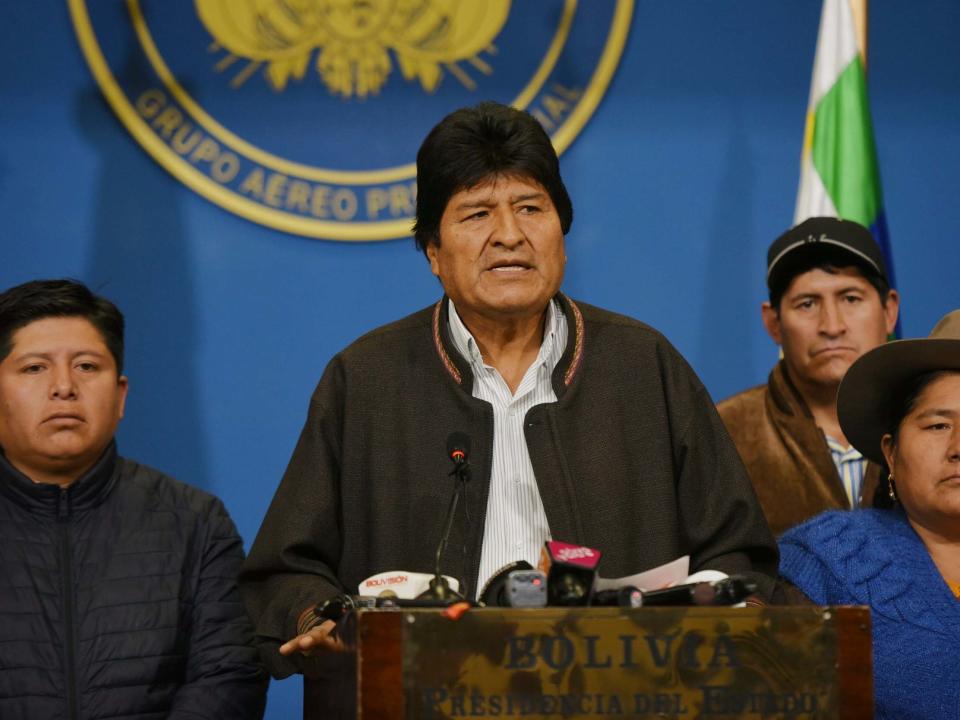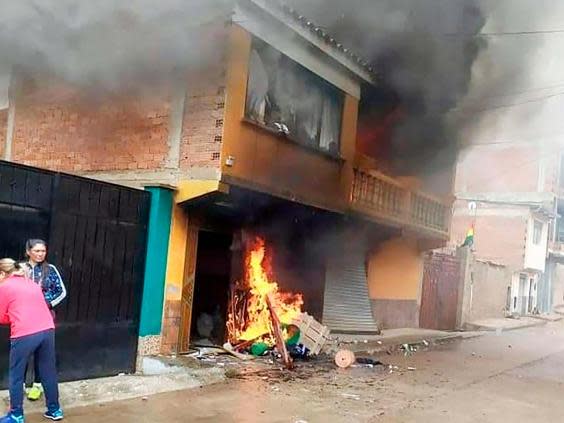Bolivian president Evo Morales resigns after fierce election backlash

Bolivian president Evo Morales has announced his resignation amid unrest over a disputed election he had claimed to win.
The leader faced mounting pressure to resign after the Organisation of American States (OAS) found “serious irregularities” in the 20 October presidential election vote.
Mr Morales said he was stepping down “for the good of the country”, according to reports.
His resignation came hours after the head of the country’s military called on Mr Morales to step down, while appealing to Bolivians to desist from violence.
Mr Morales declared himself the outright winner after last month’s vote, even before official results indicated he had gained just enough support to avoid a runoff with opposition leader Carlos Mesa.
Questions were raised when an official fast count by the Supreme Electoral Tribunal abruptly stopped in the evening after the vote, with almost 84 per cent of the count complete.
At that point, it showed Mr Morales and Mr Mesa heading to a second round.
However after a near 24-hour pause to the count, the data was updated the following evening, this time showing Mr Morales with more than a 10-point lead, handing him an outright victory.
The OAS report on Sunday declared there were irregularities, “serious security flaws” in the computer systems and “clear manipulation” of the count, which called the into question Mr Morales’ victory.

His re-election triggered weeks of unrest which left three people dead and more than 100 injured in clashes between his supporters and opponents.
Just minutes after the 60-year-old socialist leader stepped down, vice president Alvaro Garcia Linera also resigned, followed by senate president Adriana Salvatierra.
Two government ministers, the Chamber of Deputies president and three other pro-government legislators also quit earlier in the day.
Mining minister Cesar Navarro and Chamber of Deputies president Victor Borda both cited fear for the safety of their families as their reason for stepping down.
The head of Bolivia’s Supreme Electoral Tribunal also stepped down after the OAS findings were released, and the attorney general’s office said it will investigate judges on the tribunal for alleged fraud.
Mexican foreign minister Marcelo Ebrard offered Mr Morales asylum, adding that Mexico had received 20 Bolivian officials at its official residence in La Paz.
The country’s president Andres Manuel Lopez Obrador wrote on Twitter that the Mexico ”recognised the responsible attitude of the president of Bolivia, Evo Morales, who preferred to resign rather than to expose his people to violence”.
Venezuelan president Nicolas Maduro also condemned a “coup” against his leftist ally Mr Morales, adding in a Twitter post: “We categorically condemn the coup realised against our brother president.”
Mr Morales was the first member of indigenous population to become president and was in power for 13 years and nine months, the longest term in the country’s history.
He ran for a fourth term after refusing to abide by the results of a referendum that upheld term limits for the president. He was able to run because Bolivia’s constitutional court disallowed such limits.
During the unrest, protesters torched the headquarters of local electoral tribunal offices and set up roadblocks that paralysed parts of Bolivia.
Pressure on Mr Morales increased on Saturday when police on guard outside Bolivia’s presidential palace abandoned their posts and police retreated to their barracks in at least three cities.
In a statement on Sunday, the leader said: “I am sending my resignation letter to the Legislative Assembly of Bolivia.
“I ask you to stop attacking the brothers and sisters, stop burning and attacking.”
Additional reporting by Associated Press
Read more
Bolivia’s president calls new election after police join protesters
Bolivian protesters drag mayor through street and cut off her hair
